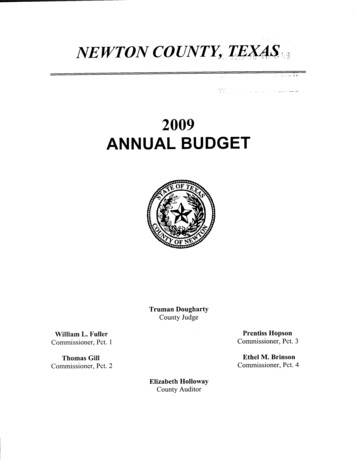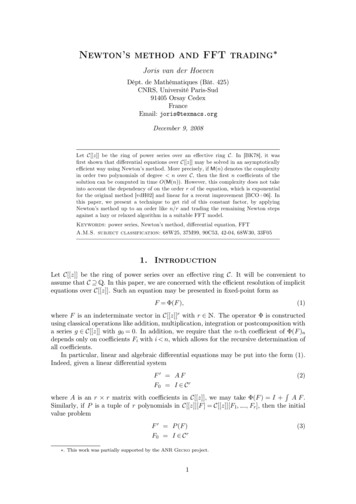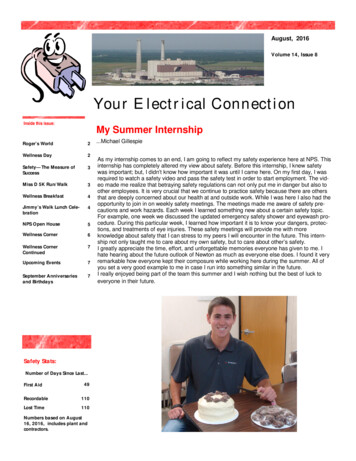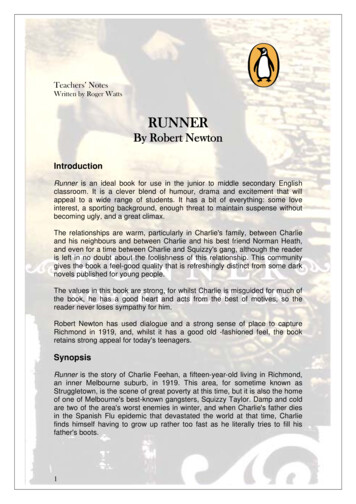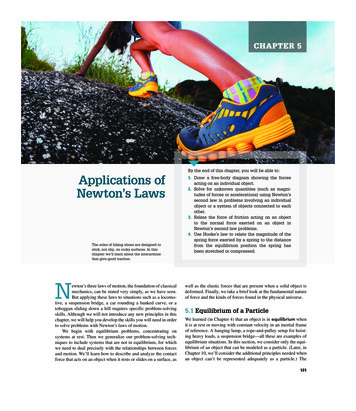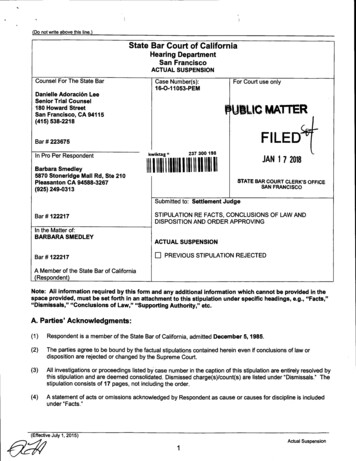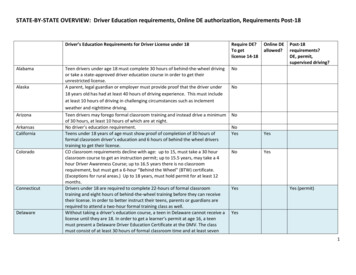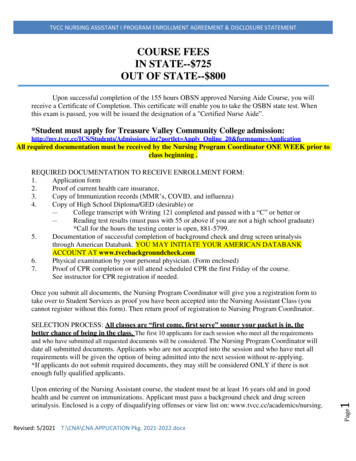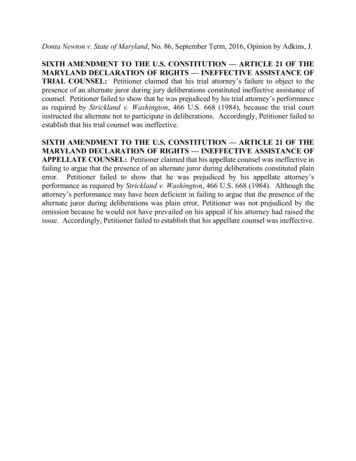
Transcription
Donta Newton v. State of Maryland, No. 86, September Term, 2016, Opinion by Adkins, J.SIXTH AMENDMENT TO THE U.S. CONSTITUTION — ARTICLE 21 OF THEMARYLAND DECLARATION OF RIGHTS — INEFFECTIVE ASSISTANCE OFTRIAL COUNSEL: Petitioner claimed that his trial attorney’s failure to object to thepresence of an alternate juror during jury deliberations constituted ineffective assistance ofcounsel. Petitioner failed to show that he was prejudiced by his trial attorney’s performanceas required by Strickland v. Washington, 466 U.S. 668 (1984), because the trial courtinstructed the alternate not to participate in deliberations. Accordingly, Petitioner failed toestablish that his trial counsel was ineffective.SIXTH AMENDMENT TO THE U.S. CONSTITUTION — ARTICLE 21 OF THEMARYLAND DECLARATION OF RIGHTS — INEFFECTIVE ASSISTANCE OFAPPELLATE COUNSEL: Petitioner claimed that his appellate counsel was ineffective infailing to argue that the presence of an alternate juror during deliberations constituted plainerror. Petitioner failed to show that he was prejudiced by his appellate attorney’sperformance as required by Strickland v. Washington, 466 U.S. 668 (1984). Although theattorney’s performance may have been deficient in failing to argue that the presence of thealternate juror during deliberations was plain error, Petitioner was not prejudiced by theomission because he would not have prevailed on his appeal if his attorney had raised theissue. Accordingly, Petitioner failed to establish that his appellate counsel was ineffective.
Circuit Court for Baltimore CityCase No.: 104310025Argued: May 9, 2017IN THE COURT OF APPEALSOF MARYLANDNo. 86September Term, 2016DONTA NEWTONv.STATE OF MARYLANDBarbera, n by Adkins, J.Getty, J., dissents.Filed: August 23, 2017
In postconviction cases, we must often navigate the fine line between a defendant’sright to a fair trial on the one hand and the legal system’s interest in finality on the other.Today we are faced with the question of whether a postconviction petitioner’s trial counselwas constitutionally ineffective in consenting to the presence of an alternate juror duringdeliberations. We also address whether his appellate counsel was ineffective in failing toargue that the alternate juror’s presence was plain error.FACTS AND LEGAL PROCEEDINGSOn the evening of September 20, 2004, Jerrell Patillo went to “hang out” with oldfriends in Baltimore City, including Petitioner Donta Newton. While Newton and Patillowere talking, Newton, for no apparent reason, began shooting at Patillo. A bullet struckPatillo in the back, and he fell to the ground. Newton attempted to shoot him again, buthis gun jammed, and Patillo fled down the street. After Newton cleared his gun, he ranafter Patillo, shooting at him. A second bullet struck Patillo in his left buttock. He survivedhis injuries.Newton was charged with attempted first-degree murder and various handgunrelated offenses in the Circuit Court for Baltimore City. His case was tried twice. OnFebruary 7, 2006, the first trial was declared a mistrial due to juror absences and schedulingconflicts. The court empaneled another jury and the second trial began that same day.During the second trial, the court excused one juror due to illness, and an alternate wasseated in his place. Another juror requested to be excused because he had a doctor’sappointment the next day. The court declined his request.
At the close of the trial, the court called State and defense counsel to the bench, andthe following exchange ensued:THE COURT: I have never done this before, but I mightsuggest that, generally, I excuse the alternate juror, but I needyour answer anyway. I am open to any request that you wantto keep the alternate in the courtroom or let the alternate go tothe Jury Room with instructions not to participate, in light ofmy past experience in the case.[PROSECUTOR:] Your Honor, I would not object to thesecond one with instructions not to participate unless weexcuse a juror. I agree.THE COURT: Send all of them to the jury room?[PROSECUTOR:] Yes.[DEFENSE COUNSEL:] Yes.THE COURT: With the instruction not to participate?[PROSECUTOR:] Uh-huh.[DEFENSE COUNSEL:] Yes.THE COURT: All right.[DEFENSE COUNSEL:] Fine. I’m just thinking maybe youcould expand on that a little bit and tell them why—THE COURT: Alternates are not to participate in thediscussion.[DEFENSE COUNSEL:] Fine.[PROSECUTOR:] That’s fine, Your Honor.Before sending the jury to deliberate, the court instructed the jury and alternate:Now, I’m going to ask that the alternate juror go to the juryroom, stay with the jury until they reach a decision. However,2
you are the alternate juror, therefore, you are not to participatein any of the discussion. Sit and listen carefully and the reasonfor that is, heaven forbid something should happen that causesone of the [12] jurors not to be able to return or continue, youcould become the [twelfth] juror. Please, the 12 jurors,understand that the alternate is not to be involved in thediscussion, so don’t let her. I think everybody will understandto participate in that, perhaps, she needs to be there to heareverything going on, so that in the unlikely event she is neededas a juror she can step right in without missing a beat, so tospeak.The jury deliberated for approximately two hours and twenty minutes. Before thejury returned, the following exchange occurred at the bench:[PROSECUTOR:] Your Honor, any verdict of guilty, I don’tknow what is appropriate to make sure Juror No. 13, alternate,did not speak or did not participate. I want to put on the recordjust to make sure. I don’t know if that is appropriate or not.[DEFENSE COUNSEL:] I don’t see the need for it. Youinstructed. You don’t have an indication to the contrary.THE COURT: I agree.The jury found Newton guilty on all counts. He was sentenced to life imprisonmentfor attempted first-degree murder and two consecutive five-year sentences for the handgunrelated charges. Newton appealed his convictions.On appeal, Newton argued that the trial court failed to properly instruct the juryregarding reasonable doubt, attempted first-degree murder, and the handgun-relatedoffenses. He also contended that he was not properly advised of his right to testify. Newtondid not argue that the presence of the alternate juror during deliberations was plain error.The Court of Special Appeals rejected Newton’s arguments and affirmed his convictions3
in an unreported opinion. Newton v. State, No. 2827, slip op. at 5, 7 (Md. Ct. Spec. App.Feb. 22, 2008).In March 2012, Newton filed a petition for postconviction relief in the Circuit Courtfor Baltimore City pursuant to the Uniform Postconviction Procedure Act (“UPPA”),Maryland Code (1957, 2008 Repl. Vol.), §§ 7-101 through 7-109 of the CriminalProcedure Article (“CP”). He raised several grounds for relief, including violations of hisright to effective assistance of counsel under the Sixth Amendment of the U.S. Constitutionand Article 21 of the Maryland Declaration of Rights.1 Specifically, Newton alleged that:(1) his trial attorney was ineffective because he failed to object to an alternate juror beingpresent in the jury room during deliberations in violation of Maryland Rule 4-312(g)(3);21Article 21 of the Maryland Declaration of Rights provides:That in all criminal prosecutions, every man hath a right to beinformed of the accusation against him; to have a copy of theIndictment, or charge, in due time (if required) to prepare forhis defence; to be allowed counsel; to be confronted with thewitnesses against him; to have process for his witnesses; toexamine the witnesses for and against him on oath; and to aspeedy trial by an impartial jury, without whose unanimousconsent he ought not to be found guilty.(Emphasis added.)2Maryland Rule 4-312(g)(3) provides:Discharge of Jury Member. At any time before the jury retiresto consider its verdict, the trial judge may replace any jurymember whom the trial judge finds to be unable or disqualifiedto perform jury service with an alternate in the order ofselection set under section (e). When the jury retires to4
(2) his appellate counsel was ineffective in failing to argue that the alternate juror’spresence during deliberations was plain error; and (3) the trial court erred in permitting thealternate to sit in on deliberations. In February 2013, the postconviction court found infavor of Newton, agreeing with him on all three issues.3 Accordingly, the court grantedNewton a new trial. The State appealed.The Court of Special Appeals reversed. The intermediate appellate court held thatNewton’s attorney made a valid strategic decision when he agreed to let the alternate sit inon deliberations, and therefore was not ineffective. State v. Newton, 230 Md. App. 241,270–71 (2016). The court further held that Newton’s appellate counsel’s performance wasnot deficient because it was unlikely that the presence of the alternate would be deemedplain error, especially given that trial counsel had agreed to the arrangement. Id. at 272–73. The court did not address whether the trial court erred in instructing the alternate to sitin on deliberations. Id. at 245 n.2.consider its verdict, the trial judge shall discharge anyremaining alternates who did not replace another jury member.(Emphasis added.)3The postconviction court also found that Newton’s trial attorney renderedineffective assistance of counsel because he failed to object to statements regarding witnessintimidation in the State’s closing arguments. The Court of Special Appeals reversed onthis issue. State v. Newton, 230 Md. App. 241, 257 (2016). Newton raised this issue in hisPetition for Writ of Certiorari, but we declined to grant certiorari as to this question.5
We granted Newton’s Petition for Certiorari to consider the following questions:41. Did the postconviction court correctly conclude thatNewton’s trial counsel was ineffective in consenting to thepresence of an alternate juror during deliberations?2. Did the postconviction court correctly conclude thatNewton’s appellate counsel was ineffective in failing toraise the issue of an alternate juror’s presence duringdeliberations?Because we answer these questions in the negative, we shall affirm the judgment ofthe Court of Special Appeals.STANDARD OF REVIEWThe review of a postconviction court’s findings regarding ineffective assistance ofcounsel is a mixed question of law and fact. Harris v. State, 303 Md. 685, 698 (1985).Because we are not finders of fact, we defer to the factual findings of the postconvictioncourt unless clearly erroneous. Id. at 698. But we review the court’s legal conclusionregarding whether the defendant’s Sixth Amendment rights were violated without4We have rephrased and divided Newton’s first question presented into twoseparate questions. Newton presented two questions for our review, and we grantedcertiorari on the first:1. Whether the Court of Special Appeals erred in reversing theCircuit Court’s determination that trial counsel, appellatecounsel and the trial court committed reversible error inpermitting alternate jurors to be present during jurydeliberations?2. Whether the Court of Special Appeals erred in reversing theCircuit Court’s determination that trial counsel renderedineffective assistance of counsel in failing to object to theState’s rebuttal closing argument?6
deference. Id. at 697 (citations omitted). We “re-weigh” the facts in light of the law todetermine whether a constitutional violation has occurred. Id. at 698 (citations omitted).DISCUSSIONNewton urges us to affirm the judgment of the postconviction court granting him anew trial. He argues that his trial counsel was deficient because he failed to object to analternate juror being present during jury deliberations. He also asserts that his appellatecounsel was ineffective because she did not raise the alternate juror issue on appeal.5 TheState, on the other hand, maintains that neither Newton’s trial counsel nor his appellatecounsel were ineffective because they both made valid tactical decisions.Ineffective Assistance of Trial CounselNewton argues that his trial counsel was deficient because he was ignorant of Stokesv. State, 379 Md. 618 (2004), in which this Court held that it was reversible error for thecourt to send an alternate juror into deliberations over defense counsel’s objection. Id. at629, 642. Without knowledge of this case, Newton claims, his trial counsel could not havemade a valid tactical decision when he acquiesced to the alternate’s presence. Newtonfurther argues that the alternate’s presence during deliberations was structural error, and,5Additionally, Newton seeks to challenge the presence of the alternate juror moredirectly, without clearing the hurdles necessary for proving an ineffective counsel claim.Such a challenge is not viable. Under the Uniform Postconviction Procedure Act(“UPPA”), if a petitioner fails to allege error when he should have done so, such as at trialor on direct appeal, he waives the ability to raise the error in postconviction proceedings,absent special circumstances. Md. Code (1957, 2008 Repl. Vol.), § 7-106(b)(1) of theCriminal Procedure Article (“CP”). Because Newton’s trial attorney agreed to permit thealternate juror to be present during deliberations and Newton has not alleged specialcircumstances, he has waived the ability to raise the issue as trial court error inpostconviction proceedings.7
therefore, prejudice is presumed under the Strickland v. Washington, 466 U.S. 668 (1984),ineffective-assistance-of-counsel test. Alternatively, if prejudice is not presumed, Newtoncontends, he was prejudiced because had his trial counsel objected to the presence of thealternate, he would have been granted a new trial on appeal.This case requires us to analyze how structural error interacts with a postconvictionineffective-assistance-of-counsel claim. We begin with a discussion of these two doctrines.Structural ErrorIn general, when an appellate court finds that the trial court erred—even in violationof a defendant’s constitutional rights—it employs harmless error review to determinewhether reversal is warranted. Chapman v. California, 386 U.S. 18, 22 (1967); Arizona v.Fulminante, 499 U.S. 279, 306–07 (1991) (collecting cases). Under harmless error review,reversal is warranted unless “a reviewing court, upon its own independent review of therecord, is able to declare a belief, beyond a reasonable doubt, that the error in no wayinfluenced the verdict.” Simpson v. State, 442 Md. 446, 457 (2015) (citation omitted).But the U.S. Supreme Court has acknowledged that certain constitutional rights are“so basic to a fair trial that their infraction can never be treated as harmless error.”Chapman, 386 U.S. at 23. These errors are known as structural errors because they“affect[ ] the framework within which the trial proceeds” and are not “simply an error inthe trial process itself.” Fulminante, 499 U.S. at 310. If a structural error is objected to attrial and raised on direct appeal, “the defendant [ ] is entitled to automatic reversalregardless of the error’s actual effect on the outcome.” Weaver v. Massachusetts, 137S. Ct. 1899, 1910 (2017) (citation and internal quotation marks omitted). Even when an8
error is deemed “structural,” however, a defendant must preserve the issue for appellatereview to be entitled to an automatic reversal. Savoy v. State, 420 Md. 232, 243 n.4 (2011).In Weaver, Justice Kennedy, writing for the majority, explained that there are threebroad categories of structural error. The first category includes errors in which “the rightat issue is not designed to protect the defendant from erroneous conviction but insteadprotects some other interest,” such as when a defendant is denied the ability to conduct hisown defense. Weaver, 137 S. Ct. at 1908 (citing McKaskle v. Wiggins, 465 U.S. 168, 177–78 n.8 (1984)). These errors are deemed structural because their impact on the outcome ofthe trial is irrelevant to the right violated. Id. The second category includes errors forwhich the effects “are simply too hard to measure,” such as a denial of the defendant’scounsel of choice. Id. (citing United States v. Gonzalez-Lopez, 548 U.S. 140, 149 n.4).These errors are structural because it would be “almost impossible” for the State to showthat they were harmless beyond a reasonable doubt. Id. Lastly, the third categoryencompasses errors that “always result[ ] in fundamental unfairness.” Id. These errorsinclude denying an indigent criminal defendant counsel and failing to give a reasonabledoubt jury instruction. Id. (citing Gideon v. Wainwright, 372 U.S. 335, 343–44 (1963);Sullivan v. Louisiana, 508 U.S. 275, 279 (1993)). Because these errors always result in afundamentally unfair trial, it would be pointless for the State to attempt to show that suchan error was harmless. Id.This Court has found structural error in two cases. In Savoy, the Court concludedthat an error in a reasonable doubt jury instruction was structural, but it did notautomatically reverse because the defendant’s attorney had not objected to the instruction.9
420 Md. at 254. Instead, because the error was unpreserved, we conducted plain errorreview and held that it warranted reversal. Id. at 255–56. In Harris v. State, 406 Md. 115(2008), we held, based on the Maryland Constitution, that an unsworn jury was a structuralerror that required automatic reversal. Id. at 130–32.Ineffective Assistance of CounselThe Sixth Amendment to the U.S. Constitution grants criminal defendants a right toeffective assistance of counsel. Strickland, 466 U.S. at 685. Under Strickland, to establishineffective assistance of counsel, a defendant must show that: (1) his attorney’sperformance was deficient; and (2) he was prejudiced as a result. Id. at 687.As to the first prong, the defendant must show that his “counsel’s representation fellbelow an objective standard of reasonableness, and that such action was not pursued as aform of trial strategy.” Coleman v. State, 434 Md. 320, 331 (2013) (quoting Strickland,466 U.S. at 687–89) (internal quotation marks omitted).We have explained that“[p]revailing professional norms define what constitutes reasonably effective assistance,and all of the circumstances surrounding counsel’s performance must be considered.”Mosley v. State, 378 Md. 548, 557 (2003) (citation and internal quotation marks omitted).Accordingly, “[a] fair assessment of attorney performance requires that every effort bemade to eliminate the distorting effects of hindsight, to reconstruct the circumstances ofcounsel’s challenged conduct, and to evaluate the conduct from counsel’s perspective atthe time.” Strickland, 466 U.S. at 689.To establish the second prong—prejudice—the defendant must show either: (1) “areasonable probability that, but for counsel’s unprofessional errors, the result of the10
proceeding would have been different”; or (2) that “the result of the proceeding wasfundamentally unfair or unreliable.” Coleman, 434 Md. at 340–41 (citations omitted). TheStrickland Court explained, “A reasonable probability is a probability sufficient toundermine confidence in the outcome.” Strickland, 466 U.S. at 694.Strickland also instructs that courts need not consider the performance prong andthe prejudice prong in order, nor do they need to address both prongs in every case. Id. at697; Oken v. State, 343 Md. 256, 284 (1996). As the Strickland Court explained, “If it iseasier to dispose of an ineffectiveness claim on the ground of lack of sufficient prejudice,which we expect will often be so, that course should be followed.” Strickland, 466 U.S. at697.Structural Error and Strickland’s Prejudice ProngIn Weaver, the petitioner argued that the presumption of prejudice due to a structuralerror—a violation of her public-trial right—satisfied Strickland’s prejudice prong. TheSupreme Court rejected this argument a
[DEFENSE COUNSEL:] Fine. [PROSECUTOR:] That’s fine, Your Honor. Before sending the jury to deliberate, the court instructed the jury and alternate: Now, I’m going to ask that the alternate juror go to the jury room,

